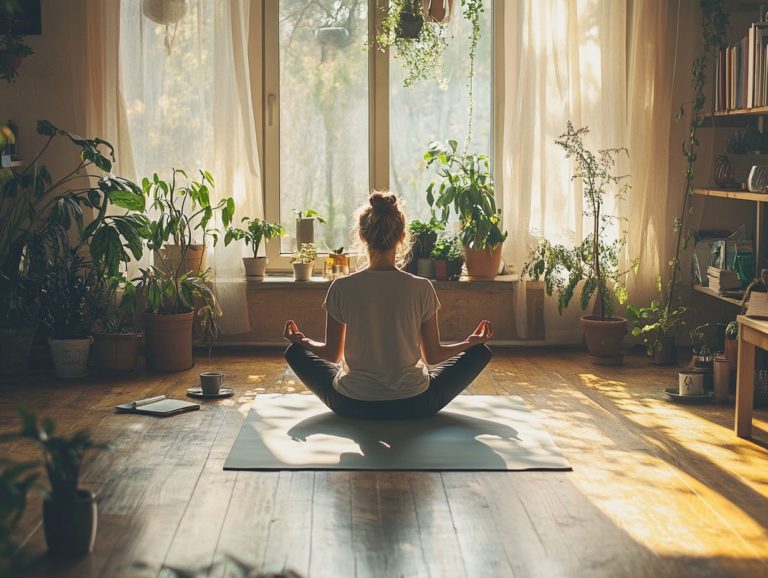Daily Meditation Practices for Better Focus
Daily meditation transcends mere trendiness; it s a transformative practice that significantly enhances your mental and physical well-being.
This article delves into the myriad benefits of weaving meditation into your daily routine, from alleviating stress to sharpening your focus.
Explore various types of meditation from guided sessions to mantra practices and discover practical tips for establishing a consistent routine that fits seamlessly into your lifestyle.
Learn how to effortlessly incorporate meditation into your everyday life and track your progress along the way.
Dive in and unlock the true potential of daily meditation!
Contents
- Key Takeaways:
- What is Daily Meditation?
- Benefits of Daily Meditation
- Types of Daily Meditation
- Creating a Daily Meditation Practice
- Tips for Establishing a Routine
- Incorporating Meditation into Daily Life
- Practical Ways to Integrate Meditation into Daily Activities
- Measuring Progress and Success
- Tracking and Reflecting on Benefits
- Frequently Asked Questions
- What are some daily meditation practices for better focus?
- How can meditation improve focus and concentration?
- Can daily meditation practices help with stress and anxiety?
- What is the best time of day to meditate for improved focus?
- Are there specific techniques or styles of meditation that can enhance focus?
- How long should I meditate each day to see the benefits of improved focus?
Key Takeaways:

- Daily meditation can improve focus by promoting mental clarity and reducing distractions.
- Different types of daily meditation, such as guided, mindfulness, and mantra, offer unique benefits and can be incorporated into daily life.
- Establishing a daily meditation routine and reflecting on its benefits can help track progress and success in achieving better focus.
What is Daily Meditation?
Daily meditation is a planned way to meditate that invites you to carve out time each day for mindfulness and meditation techniques. This practice boosts your self-awareness and enhances emotional regulation.
Meditation can take many forms, whether it s focused meditation or guided sessions, often incorporating breathing techniques to foster mental clarity and relaxation.
It s a valuable daily habit that can significantly improve your mental health and emotional well-being.
You might explore different approaches, such as loving-kindness meditation, which nurtures compassion, or transcendental meditation, known for its use of mantras.
These diverse techniques help reduce stress and anxiety while enhancing cognitive functions like attention span and memory.
Daily meditation can truly transform your life, impacting not just your emotional stability but also your overall quality of life.
By dedicating just a few moments each day to this enriching practice, you may find yourself experiencing increased resilience, better emotional regulation, and heightened mindfulness ultimately leading to a more balanced and fulfilling existence.
Benefits of Daily Meditation
The benefits of daily meditation extend far beyond mere relaxation, offering a wealth of emotional and mental health enhancements.
You will experience stress relief, improved emotional regulation, and cognitive enhancements that collectively elevate your overall well-being.
Embracing a regular meditation practice cultivates self-compassion and mental resilience, equipping you to manage anxiety with grace and enhance your attention span.
Meditation is essential for a balanced and healthy lifestyle.
Mental and Physical Health Benefits
Daily meditation offers a wealth of mental and physical health benefits, enhancing your emotional regulation and reducing stress levels.
This ultimately paves the way for a healthier lifestyle. By engaging in mindfulness techniques like focused attention meditation and breathing exercises, you can improve your cognitive function and emotional health.
Research shows that dedicating just 10 minutes a day to meditation can significantly decrease anxiety levels, with studies highlighting an impressive reduction of up to 35% in stress-related symptoms among participants.
Personal stories, such as that of a busy executive who transformed their life through daily practice, illustrate the profound improvements in mood and focus that meditation can bring.
The cumulative effect of regular meditation sharpens your concentration and enhances your emotional intelligence an essential asset for navigating life’s challenges.
These holistic benefits reinforce meditation s role as a powerful tool for fostering mental clarity and emotional stability in your life.
Start meditating today and unlock a better version of yourself!
Types of Daily Meditation
You have a wealth of daily meditation types at your fingertips, each presenting distinct methods and benefits. Focused meditation hones your concentration, while mindfulness meditation helps you be more aware of the present moment.
Guided meditation gently leads you through your journey, and mantra meditation invites you to embrace the power of repetition. By familiarizing yourself with these varied approaches, you can select the practice that resonates most with your personal growth aspirations and mental well-being.
Guided Meditation

Guided meditation involves a narrator or teacher gently leading you through a session, often weaving in mindfulness techniques and breathing exercises to deepen your relaxation.
With the convenience of meditation apps and online resources, you can easily incorporate these enriching practices into your daily routine. Discover why people love meditation apps like Headspace and Calm! These apps offer a range of sessions designed to meet various goals, whether it’s reducing stress, improving sleep, or sharpening focus.
You can also find free guided sessions on platforms like YouTube, provided by certified instructors. This vast array of resources enables you to explore different relaxation techniques and discover the approach that resonates most with you. Start your journey to inner peace today your mind will thank you!
Mindfulness Meditation
Mindfulness meditation invites you to be fully present, helping you develop mastery over your thoughts and emotions. This practice encourages focused attention, allowing you to observe your inner dialogue and enhance your emotional well-being through intentional awareness.
By adopting a non-judgmental perspective toward your experiences, mindfulness meditation becomes a powerful tool for emotional regulation. It enables you to navigate life’s challenges with resilience and clarity.
This technique not only promotes relaxation but also deepens your understanding of your thoughts and feelings, often leading to profound personal growth. Through consistent practice, you cultivate present-moment awareness, reducing anxiety and enhancing your overall well-being.
Incorporating techniques like breath awareness or body scanning which involves paying attention to different parts of your body to release tension can further strengthen your connection to yourself, enriching your journey toward inner peace and emotional stability.
Mantra Meditation
Mantra meditation invites you to embrace the repetition of a specific word, phrase, or sound, guiding your focus and fostering mental clarity. This practice aids in emotional regulation and nurtures self-compassion, allowing you to develop a more positive internal dialogue while minimizing mental distractions.
Unlike mindfulness or breath-focused meditation, which center on awareness of thoughts and sensations, mantra meditation encourages you to immerse yourself fully in the rhythmic repetition of your chosen mantra. This distinctive approach serves as a mental anchor, reducing external distractions and facilitating deeper introspection.
Research indicates that such focused practices can yield significant psychological benefits, including reduced anxiety and enhanced mood. By cultivating a serene inner landscape, you may experience heightened emotional resilience, supporting your overall mental well-being and enabling you to navigate daily challenges with a calm and collected demeanor.
Creating a Daily Meditation Practice
Establishing a daily meditation practice requires you to create a consistent routine that seamlessly incorporates mindfulness techniques, valuable meditation tips, and self-awareness strategies.
By integrating meditation into your everyday life, you enable yourself to cultivate a deeper understanding of your thoughts and emotions. This transformative process enhances your mental clarity and significantly boosts your emotional well-being.
Tips for Establishing a Routine
Establishing a meditation routine involves practical strategies that work for you, such as setting specific times, creating an inviting space, and using reminders to stay committed to this daily practice. By incorporating mindfulness techniques and specific meditation techniques into your routine, you ll likely see a boost in both consistency and effectiveness.
Consider designating a particular time each day for your meditation perhaps early in the morning to set a positive tone or in the evening to help you unwind from the day s stresses. Choosing a quiet, clutter-free space can transform your experience, allowing your mind to settle and focus more easily.
Use smartphone apps or alarms as gentle nudges to ensure meditation becomes a cherished part of your daily schedule. Don t hesitate to experiment with different styles, such as guided meditation, transcendental meditation (a technique focusing on mantra repetition), or loving-kindness meditation, to find what resonates with you and enriches your practice.
Incorporating Meditation into Daily Life

Incorporating meditation into your daily life means seamlessly integrating mindfulness techniques and breathing exercises into your routine, enhancing your stress relief and emotional regulation.
Embracing practices such as mindful movement and body scans throughout your day can cultivate a meditative state that enhances your overall mental health and well-being.
This approach helps you navigate daily challenges gracefully while fostering a deeper connection to your inner self.
Practical Ways to Integrate Meditation into Daily Activities
There are many practical ways to weave meditation into your daily activities. Consider mindful walking, performing body scans, and using relaxation techniques along with breathing cycles throughout the day. These meditation exercises can easily integrate into your routine, making it simpler to cultivate mindfulness and emotional awareness.
For instance, during mindful walking, focus on the sensation of each step, anchoring yourself in the present moment. You can practice body scans during short breaks to check in with your body and release any accumulated tension. Implementing deep breathing techniques, such as the 4-7-8 method, can be a game changer during stressful moments, providing a quick reset and nurturing a sense of calm.
By incorporating these practices into your daily schedule, you can enhance your overall well-being and cultivate a greater sense of inner peace.
Measuring Progress and Success
Measuring your progress and success in meditation involves tracking personal growth and reflecting on your meditation goals. This practice provides valuable insights into your meditation exercises and enhances your overall self-awareness.
Engaging in this reflective process encourages continuous improvement and helps you adapt your practices to align with your evolving objectives.
Tracking and Reflecting on Benefits
Tracking and reflecting on the benefits of meditation is crucial for understanding its impact on emotional regulation and overall well-being. By documenting your experiences and employing mindfulness techniques, you can truly appreciate your progress, paving the way for deeper self-reflection and improvement in your meditation practice.
Exploring various tools like dedicated journals or digital applications designed for tracking moods, thoughts, and meditation sessions can significantly enhance this journey. These resources offer a structured approach to record insights while encouraging you to set goals and monitor how meditation shapes your daily life.
Integrating emotional check-ins into your routine can help you become more attuned to shifts in your mental state, fostering greater awareness and adaptability over time. Ultimately, these practices enable you to cultivate lasting habits that enrich your emotional well-being and mindfulness in everyday situations.
Frequently Asked Questions
What is meditation?
Meditation is a practice that involves focusing the mind to achieve a mentally clear and emotionally calm state.
How long should I meditate?
Beginners can start with just 5-10 minutes a day and gradually increase the time as they become more comfortable.
Can meditation help with stress?
Yes, meditation has been shown to reduce stress levels and improve overall emotional health.
What are some daily meditation practices for better focus?

Daily meditation practices for better focus include deep breathing exercises, guided visualizations, and meditation for enhanced focus.
How can meditation improve focus and concentration?
Meditation improves focus by calming the mind and reducing distractions. It also enhances self-awareness and mental clarity.
Can daily meditation practices help with stress and anxiety?
Absolutely! Daily meditation can work wonders for stress and anxiety by promoting relaxation and reducing negative thoughts.
What is the best time of day to meditate for improved focus?
The best time to meditate varies for each person. However, many find that morning sessions set a positive tone for the day.
Are there specific techniques or styles of meditation that can enhance focus?
Yes! Techniques like Zen meditation and Vipassana are known to boost focus. These styles involve deep concentration and awareness.
How long should I meditate each day to see the benefits of improved focus?
Start with just 10-15 minutes a day to notice improvements in focus. Gradually increase your meditation time as you become more comfortable.
Start your meditation journey today to unlock your full focus potential!






